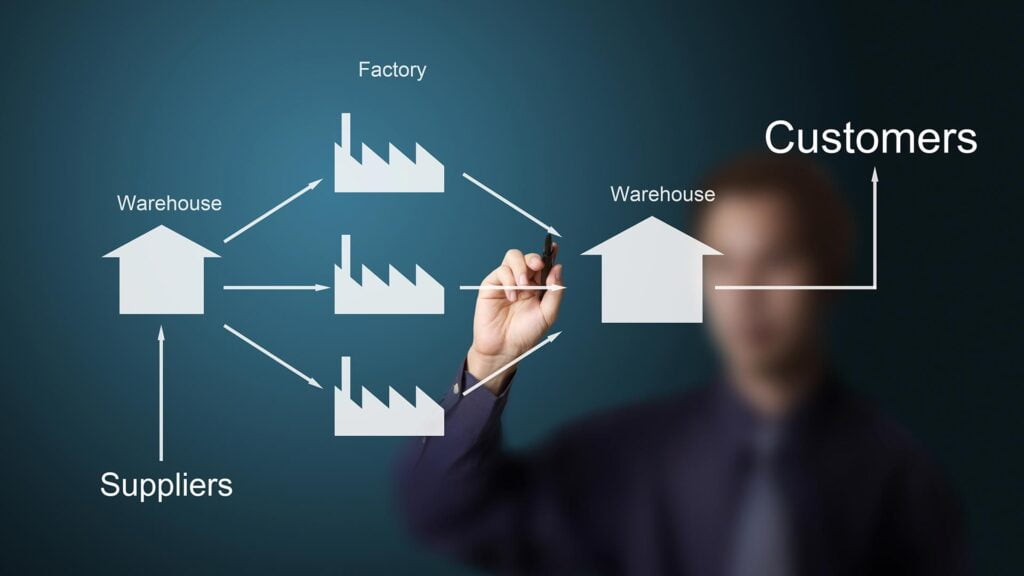The Impact of Blockchain Technology on Supply Chain Management

Table of Contents
In the ever-evolving landscape of global commerce, the fusion of technology and industry continues to reshape traditional paradigms. At the forefront of this transformation stands blockchain technology, a revolutionary innovation with the potential to revolutionize how supply chains are managed and optimized. This article delves into the profound impact of blockchain on supply chain management, exploring its capacity to enhance transparency, traceability, and efficiency in a networked world.
As we navigate through the intricacies of this cutting-edge advancement, we unravel the intricate web of possibilities it offers, presenting a compelling case for the integration of blockchain into the heart of modern supply chain ecosystems. Join us on a journey to understand how blockchain’s immutable ledger and decentralized architecture are poised to redefine not only the way products move from point A to point B but also the very essence of trust and collaboration across industries.
Revolutionizing Supply Chains: Unveiling the Transformative Power of Blockchain Technology
In an era marked by rapid technological advancements, blockchain technology has emerged as a powerful force reshaping the landscape of various industries. One area where its impact is particularly profound is supply chain management. Often hailed as a breakthrough innovation, blockchain has the potential to revolutionize supply chains by enhancing transparency, efficiency, and security in unprecedented ways.
Traditionally, supply chain management has been plagued by challenges such as lack of transparency, inefficiencies, and vulnerabilities to fraud and counterfeiting. These issues have led to increased costs, delays, and reduced customer trust. However, blockchain technology provides a promising solution to these problems by introducing a decentralized and immutable ledger system.
From Transparency to Efficiency: How Blockchain is Reshaping Supply Chain Dynamics
One of the key ways blockchain is reshaping supply chain dynamics is by providing enhanced transparency at every stage of the process. Unlike traditional systems, where information is siloed and prone to manipulation, blockchain ensures that every transaction and interaction within the supply chain is recorded in an unalterable and publicly accessible ledger. This transparency allows stakeholders to trace the journey of products from their origin to the final consumer, providing a comprehensive and tamper-proof record.
Moreover, the introduction of smart contracts within blockchain technology adds a layer of automation to supply chain operations. Smart contracts are self-executing agreements that trigger predefined actions when specific conditions are met. In the context of supply chains, this means that contractual obligations, such as payment release or quality assurance, can be automatically fulfilled once the predetermined criteria are satisfied. This not only reduces the need for intermediaries but also streamlines processes, resulting in greater efficiency and reduced operational costs.

Navigating the Future: Exploring How Blockchain Disrupts Traditional Supply Chain Management
As we navigate the future, the disruptive potential of blockchain in traditional supply chain management becomes increasingly evident. This technology offers a paradigm shift, enabling a new era of trust and collaboration among supply chain partners. With data stored in a secure and immutable ledger, the risk of fraudulent activities and data breaches is significantly reduced. This enhanced security can lead to increased confidence and cooperation between various stakeholders, fostering a more resilient and responsive supply chain ecosystem.
Furthermore, blockchain’s ability to create a single source of truth ensures that all parties involved have access to accurate and up-to-date information. This can lead to better decision-making, optimized inventory management, and improved demand forecasting. In industries like pharmaceuticals, where traceability and authenticity are of paramount importance, blockchain can prevent the circulation of counterfeit drugs, safeguarding consumer health and safety.
Also read: Exploring the Potential of Aether: Decentralized Finance and Beyond
Unlocking Value: Harnessing Blockchain’s Potential to Enhance Supply Chain Transparency and Traceability
In an era where consumers demand greater transparency, accountability, and sustainability from the products they purchase, blockchain technology has emerged as a game-changer in the world of supply chain management. By providing an immutable and decentralized ledger, blockchain offers a unique solution to the challenges of transparency and traceability that have long plagued supply chain networks.
Blockchain’s underlying structure ensures that every transaction, product movement, and data exchange is recorded in a secure and transparent manner. This capability has far-reaching implications for industries such as food, pharmaceuticals, and luxury goods, where provenance and authenticity are of paramount importance. By enabling real-time tracking and recording of every step in the supply chain, blockchain technology empowers consumers to verify the origin and journey of a product, fostering trust and enabling informed purchasing decisions.
The application of blockchain in supply chains not only enhances consumer confidence but also streamlines internal processes. By enabling all stakeholders to access a single source of truth, blockchain minimizes disputes, reduces manual reconciliation efforts, and accelerates the resolution of discrepancies. This newfound efficiency translates into cost savings and improved collaboration across the supply chain ecosystem.
However, the adoption of blockchain technology is not without its challenges. Integrating blockchain into existing supply chain infrastructure requires careful planning, investment, and education. Furthermore, ensuring data accuracy at each stage of the supply chain is crucial to maintaining the integrity of the blockchain ledger.
As the technology continues to evolve, blockchain’s potential impact on supply chain management remains significant. By addressing the long-standing issues of transparency and traceability, blockchain unlocks value by creating a more resilient, efficient, and consumer-centric supply chain ecosystem.
Blockchain’s Trailblazing Influence: A Deep Dive into Supply Chain Optimization and Security
In an increasingly interconnected and globalized world, supply chains have grown in complexity, posing a myriad of challenges related to efficiency, security, and trust. Enter blockchain technology, a trailblazer that has the potential to revolutionize supply chain optimization and security in ways previously unimaginable.
At its core, blockchain operates as a distributed and tamper-proof digital ledger, ensuring that records are transparent, immutable, and resistant to manipulation. This architecture addresses long-standing concerns in supply chain management, such as counterfeit goods, unauthorized alterations, and inefficient documentation processes.
Blockchain’s impact on supply chain optimization is two-fold. First, it introduces a shared, real-time record of transactions and movements across the supply chain, eliminating information silos and enhancing visibility. This heightened transparency enables stakeholders to make informed decisions, anticipate disruptions, and optimize inventory management. Second, smart contracts, a feature of blockchain technology, automate and enforce predefined actions based on certain conditions. This automation not only streamlines processes but also reduces the risk of errors and delays.
Security is another area where blockchain shines. Traditional supply chains are vulnerable to cyberattacks, data breaches, and unauthorized access. Blockchain’s cryptographic protocols ensure data integrity and authentication, significantly reducing the risk of cyber threats. Additionally, by eliminating intermediaries and central points of control, blockchain enhances resilience against single points of failure.
Yet, the adoption of blockchain technology requires careful consideration. Integration with existing systems, ensuring interoperability, and managing the transition are complex tasks. Moreover, the energy-intensive nature of certain blockchain implementations necessitates a balance between environmental concerns and technological progress.
As supply chains continue to evolve, blockchain’s trailblazing influence stands as a beacon of innovation. By optimizing processes, enhancing security, and redefining trust, blockchain technology paves the way for a more efficient, resilient, and interconnected supply chain landscape.
Also read: Aether Smart Contracts: Enabling Trustless Transactions
Redefining Success: Evaluating the Role of Blockchain in Modernizing Global Supply Chain Networks
The modern supply chain landscape is marked by its complexity, with products traversing a labyrinthine network of suppliers, manufacturers, distributors, and retailers spanning the globe. As this intricacy grows, so does the need for innovation that can redefine success in supply chain management. Enter blockchain technology, a disruptive force with the potential to modernize global supply chain networks and usher in a new era of efficiency and collaboration.
Blockchain’s impact on supply chain networks is multi-faceted, with its most notable contribution being the creation of a decentralized and transparent ledger. In a world where consumers demand authenticity and accountability, blockchain provides an immutable record of a product’s journey from source to shelf. This traceability not only enhances consumer trust but also allows for rapid and precise recalls in case of product defects, thereby minimizing risks to public health and safety.
Moreover, blockchain’s role in modernizing supply chains extends to optimizing operational processes. By enabling real-time monitoring and data sharing among stakeholders, blockchain reduces delays, prevents fraud, and streamlines paperwork. The automation capabilities of smart contracts further enhance efficiency, ensuring that contractual obligations are met without the need for intermediaries.
The decentralized nature of blockchain also addresses issues of data ownership and control. It empowers suppliers, manufacturers, and distributors to maintain control over their data while securely sharing relevant information with authorized parties. This self-sovereign approach not only reduces the risk of data breaches but also promotes collaboration and innovation.
However, the successful integration of blockchain into supply chain networks requires overcoming various challenges. Interoperability with existing systems, scalability concerns, and regulatory compliance are critical factors that need to be navigated. Additionally, addressing the environmental impact of energy-intensive blockchain networks is an ongoing consideration.
As supply chain networks continue to evolve, blockchain’s potential to redefine success is undeniable. By modernizing processes, enhancing transparency, and fostering collaboration, blockchain technology offers a compelling vision of a future where global supply chains operate seamlessly, efficiently, and with renewed trust.

FAQS
Q: What is blockchain technology?
A: Blockchain technology is a decentralized and secure digital ledger system that records and verifies transactions across multiple computers, ensuring transparency and immutability.
Q: How does blockchain impact supply chain management?
A: Blockchain enhances supply chain management by providing transparency, traceability, and increased security for transactions and data sharing.
Q: What is supply chain management?
A: Supply chain management is the coordination of activities involved in the production, distribution, and delivery of goods and services from suppliers to customers.
Q: What challenges does blockchain address in supply chains?
A: Blockchain addresses challenges such as lack of transparency, fraud, counterfeiting, and inefficiencies in tracking goods and verifying their origins.
Q: How does blockchain enhance transparency in supply chains?
A: Blockchain records every transaction in a tamper-proof manner, allowing all participants to view and verify the entire history of a product, ensuring transparency at every stage.
Q: What is the role of smart contracts in supply chain management with blockchain?
A: Smart contracts are self-executing contracts with predefined rules. In supply chain management, they automate processes like payment, verification, and compliance, reducing delays and disputes.
Q: Can blockchain prevent counterfeit products in supply chains?
A: Yes, blockchain can help prevent counterfeiting by creating an unalterable record of a product’s journey from production to the consumer, making it difficult for counterfeit items to enter the chain undetected.
Q: How does blockchain enhance traceability in supply chains?
A: Blockchain enables real-time tracking of products, ingredients, and components, allowing stakeholders to trace the origins and journey of items, ensuring quality and compliance.
Q: What impact does blockchain have on supply chain efficiency?
A: Blockchain streamlines processes, reduces paperwork, eliminates intermediaries, and enhances data accuracy, leading to improved efficiency and faster transactions.
Q: Is data security improved with blockchain in supply chain management?
A: Yes, blockchain’s cryptographic nature ensures that data is secure, and its decentralized structure makes it harder for malicious actors to tamper with information.
Q: Are there any limitations to implementing blockchain in supply chains?
A: Challenges include integration with existing systems, scalability concerns, regulatory issues, and the need for collaboration among supply chain partners.
Q: How is blockchain technology influencing transparency for consumers?
A: Consumers can access detailed information about a product’s journey, origin, and authenticity, empowering them to make informed purchasing decisions.
Q: Can blockchain improve sustainability in supply chains?
A: Yes, blockchain can track and verify sustainable practices, such as ethical sourcing and environmentally friendly production methods, encouraging responsible supply chain management.
Q: What industries are adopting blockchain for supply chain management?
A: Industries like food, pharmaceuticals, luxury goods, automotive, and logistics are actively adopting blockchain to enhance transparency and efficiency in their supply chains.




